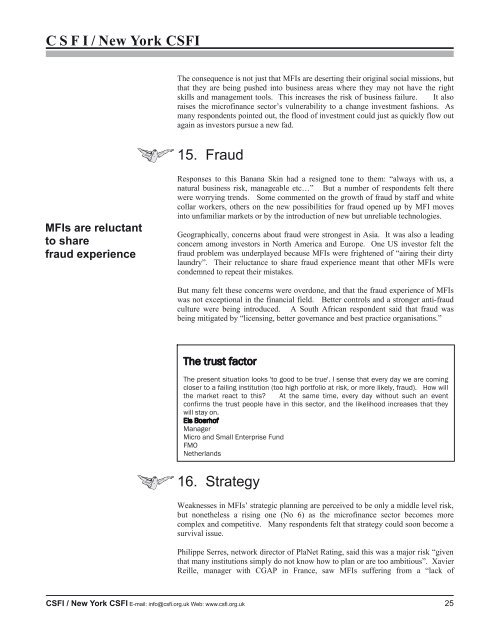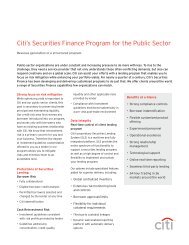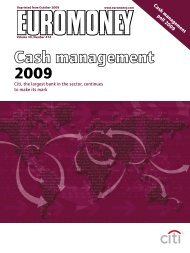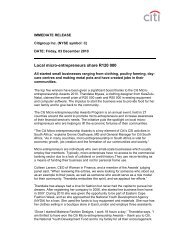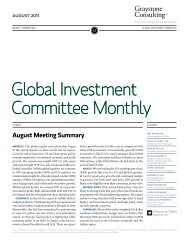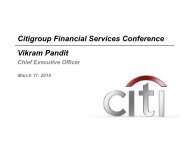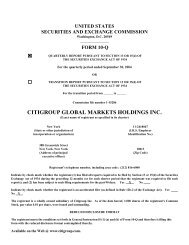C S F I / New York CSFI14. Mission driftMounting commercial pressures are are pushing MFIs away from from their their original missionsof of poverty alleviation and and financial inclusion. This This is seen seen as as a a strongly rising risk riskin in many parts of of the the world.A A respondent from Mexico said said that that “as “as microfinance becomes more lucrative, the theinitial objective of of sustained socio-economic development is is being brushed aside.” A Apractitioner in in Haiti said said that that pressures from profit-seeking investors “will lead, lead, little littleLoans for for jewellery and cosmetics<strong>Microfinance</strong> is is now now seen seen as as a a highly profitable area area in in which to to invest,forgetting/ignoring that that the the clients behind the the "profits" are are people from from very very low lowincome sectors, living living at at the the margin and and using microloans as as a way a way to to improve their theirsmall incomes. This This is attracting many new new profit-seeking players with with access to tofunding and and technological advances that that genuine microcredit players will will find find very veryhard hard to to compete with. with.These new new players are are inducing "the "the poor" to to take take out out loans that that carry carry very very high highinterest rates rates for for short short term term consumer purposes, rather than than for for productive activitieswhich require serious loan loan repayment capacity and and lower interest rates. Consumerloans are are going to to purchase luxury items such such as as jewellery, ornaments, perfumes and andcosmetics, even even "wellness" products that that "poor women” sell sell to to other "poor women".In In countries with with large large populations living below the the poverty line line (Mexico, Brazil,Argentina to to name a few a few in in this this region) this this consumer lending mentality will will seriouslythreaten the the performance of of the the microcredit sector and, and, more importantly, will willproduce clients who who are are unable to to repay their their loans, who who end end up up in in credit risk riskbureaux, and and will will never again have have access to to a a loan. loan. In In the the meantime, the the new newplayers will will make enough profits so so that, that, when the the going gets gets tough, they they will will get get out outof of the the market and and no no one one will will care care about the the many who who are are left left in in "civic "civic death" on on the theway. way.Pilar Pilar RamirezGeneral managerLocfundBolivia“The initialobjective is is beingbrushed aside”by by little, to to MFIs putting profitability ahead of of social development objectives”. In InSyria, Namaan Adra, country manager of of the the Aga Aga Khan Agency for for <strong>Microfinance</strong>,feared that that “due “due to to pressure to to be be sustainable, MFIs will will change their their focus from frompoverty reduction to to profit-making. This This is is compounded by by the the increase in incompetition from the the commercial sector”. Prakash Raj Raj Sharma, general manager of ofNirdhan Utthan Bank in in Nepal, said said that that “in “in the the name of of sustainability, someinstitutions are are trying to to make themselves more commercial…I think the the challenge is isto to create a a balance between a a pro-poor system and and commercialisation”.This This <strong>Banana</strong> Skin Skin provoked dozens of of passionate responses, most most of of which blamedreturn-hungry investors for for turning up up the the commercial heat heat on on MFIs. A A respondentfrom from India said said investors were were pushing MFIs to to deliver “faster growth at at the the cost cost of ofsacrificing their their reach to to the the underprivileged community.”Jerome Aba, Aba, a amicrofinance expert at at PlaNet Finance in France, said said that that “too “too many financiers are areimposing their their diktats supposedly on on the the basis of of ‘sustainability’”. Malcolm Harper,an an independent researcher, said said that that microfinance was was in in danger of of becoming “just “justanother exploitative business which will will continue the the trend towards growinginequity, worldwide.”24 CSFI / New York CSFI E-mail: info@csfi.org.uk Web: www.csfi.org.uk
C S F I / New York CSFIThe The consequence is is not not just just that that MFIs are are deserting their their original social missions, but butthat that they they are are being pushed into into business areas where they they may may not not have have the the right rightskills and and management tools. This This increases the the risk risk of of business failure. It It also alsoraises the the microfinance sector’s vulnerability to to a a change investment fashions. As Asmany respondents pointed out, out, the the flood of of investment could just just as as quickly flow flow out outagain as as investors pursue a new a new fad. fad.15. FraudMFIs are reluctantto to sharefraud experienceResponses to to this this <strong>Banana</strong> Skin Skin had had a a resigned tone tone to to them: “always with with us, us, a anatural business risk, risk, manageable etc…” But But a a number of of respondents felt felt therewere worrying trends. Some commented on on the the growth of of fraud by by staff staff and and whitecollar workers, others on on the the new new possibilities for for fraud opened up up by by MFI MFI movesinto into unfamiliar markets or or by by the the introduction of of new new but but unreliable technologies.Geographically, concerns about fraud were were strongest in in Asia. It It was was also also a a leadingconcern among investors in in North America and and Europe. One One US US investor felt felt the thefraud problem was was underplayed because MFIs were were frightened of of “airing their their dirty dirtylaundry”. Their reluctance to to share fraud experience meant that that other MFIs werecondemned to to repeat their their mistakes.But But many felt felt these concerns were were overdone, and and that that the the fraud experience of of MFIswas was not not exceptional in in the the financial field. Better controls and and a a stronger anti-fraudculture were were being introduced. A A South African respondent said said that that fraud was wasbeing mitigated by by “licensing, better governance and and best best practice organisations.”The trust factorThe The present situation looks 'to 'to good good to to be be true'. true'. I I sense that that every day day we we are are comingcloser to to a a failing institution (too (too high high portfolio at at risk, risk, or more likely, fraud). How How will willthe the market react react to to this? this? At At the the same time, time, every day day without such such an an eventconfirms the the trust trust people have have in in this this sector, and and the the likelihood increases that that they theywill will stay stay on. on.Els Els BoerhofManagerMicro and and Small Enterprise Fund FundFMO FMONetherlands16. StrategyWeaknesses in in MFIs’ strategic planning are are perceived to to be be only only a a middle level level risk, risk,but but nonetheless a a rising one one (No (No 6) 6) as as the the microfinance sector becomes morecomplex and and competitive. Many respondents felt felt that that strategy could soon soon become a asurvival issue.Philippe Serres, network director of of PlaNet Rating, said said this this was was a a major risk risk “giventhat that many institutions simply do do not not know how how to to plan plan or or are are too too ambitious”. XavierReille, manager with with CGAP in in France, saw saw MFIs suffering from a a “lack of ofCSFI / New York CSFI E-mail: info@csfi.org.uk Web: www.csfi.org.uk 25


